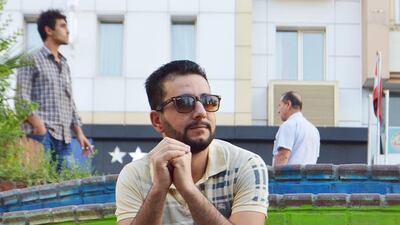ISTANBUL // Sami Al Sari will never forget the sheer terror of lying next to so many corpses in the back of the hearse.
“They were naked, signs of torture were obvious on their bodies and faces,” he recalled of the day when he was finally reunited with his family after four months of vicious torture in the hands of Syria’s regime forces.
The 25-year-old Syrian was smuggled out of a notorious prison in a hearse full of dead inmates, and dumped in a desolate area outside Damascus in November 2012. His escape was possible only because his family paid a hefty sum of two million Syrian pounds (Dh34,440) to rescue him.
"I was surrounded by horror for a whole hour that felt like a decade," he told The National.
When the Syrian revolution started in 2011, Sami was only 20 years old and a final year student studying political science at Damascus University. Like many other youths at that time, he could not sit and watch the uprising happening in his country without taking part in it. Full of hopes and ambitions for himself and his people, he never imagined his life would take such a sharp turn until one fateful day in 2012.
On July 16 that year, more than a year after the Arab Spring started, Syrian security forces stormed Sami’s house, and arrested him and his four friends for taking part in a protest in front of the Iranian embassy.
“At that moment, everything turned dark in front of my eyes. Not just because I was blindfolded, but also for knowing where I was taken to. I heard many horror stories of that place, and I thought I would be one lucky guy if I ever made it out alive,” Sami said.
He and his friends were taken to the so-called “Apparatus 215” – an infamous detention centre run by forces loyal to president Bashar Al Assad. It was there that the “torture festival” began, said Sami.
The guards separated the friends, and placed Sami in solitary confinement. He has not seen or heard any news of his friends since then.
“The cell was very dirty. I couldn’t sleep or sit at the beginning. There were bugs and rodents everywhere. I was getting just one meal a day that contained a piece of bread with a barely edible potato, and one dirty bottle of water,” Sami recalled.
His torture “took many shapes and methods”.
“I was beaten and lashed with a whip on my whole body, put on a torturing chair called ‘Nazi’s chair’ that almost broke my back, cigarettes were put out in my body, and I was hung from a windowsill for hours. It was four months of non-stop torture,” Sami said.
“Then came the electrocution. They would shock me on my head, my neck and all over. It was extremely painful.”
Sami was heavily and routinely electrocuted, until one day when he lost consciousness during one of the sessions. He thinks it was around this time that he suffered a temporary loss of memory and has little recollection of what his tormentors did to him after that.
He believes, however, that they continued to torture him even when he was experiencing amnesia. “When I eventually gained some of my memory back, I was able to see clearly the signs of torture all over my body,” he said.
During his captivity, Sami’s family tried relentlessly to get him out. After a few weeks, they were finally able to reach an officer from the prison through a mediator.
The officer agreed to help them if they paid him two million Syrian pounds, and came up with the idea of smuggling Sami out with his dead fellow inmates. He also agreed to deliver Sami to an uninhabited area right outside Damascus.
It was when he was next to all the dead bodies that he “started recalling everything I went through until that moment”, he said.
After an hour, “the car stopped, the back door was opened and I was dumped on the road”, he said.
“I saw my brother approaching the car and then he held me and hugged me, and took me home.”
Plagued by memories of the grisly experience, he was unable to eat or sleep due to the constant nightmares. His family eventually took him to Lebanon for treatment, where a psychiatrist took care of him for a few weeks, before he returned to Syria.
Not long after, the security forces began pursuing him again when they heard of his escape.
Following months on the run, Sami’s family decided to relocate with him from Damascus to the eastern city of Deir Ezzor, where they were originally from. He finally made it to Turkey in April this year after obtaining fake identification papers and enduring an arduous journey through many checkpoints.
It was only when his family managed to escape to Turkey that he broke his silence.
But, like so many other Syrian refugees who have escaped torture and death under the tyranny of war, Sami is still struggling to get back on his feet.
“The screaming of other inmates echoed all over the place through the day and night,” he recalled of his time in prison.
“It was a horrifying thing by itself. It was unbelievably inhuman.”
foreign.desk@thenational.ae

